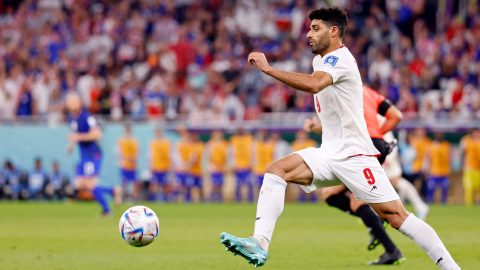 PARIS — Furious over a government plan to impose a tax on them, French soccer teams have unanimously agreed to scrap matches over one weekend at the end of November as a protest.
PARIS — Furious over a government plan to impose a tax on them, French soccer teams have unanimously agreed to scrap matches over one weekend at the end of November as a protest.
France’s professional clubs held an extraordinary general meeting Thursday to decide the next steps in their campaign against the government’s plan to implement a temporary 75 percent marginal tax on employers for paying salaries above a million euros a year.
Under the decision announced Thursday by Jean-Pierre Louvel, president of the Union of Professional Football Clubs, the league round scheduled for Nov. 29-Dec. 2 will not be played.
“It’s a historic moment for French football. The whole of football has taken a very important decision,” Louvel said. “We’re talking about the death of French football. That’s why we are fighting and we will continue to fight.”
Representatives of the clubs will meet with French President Francois Hollande next week to further discuss a solution to the situation. Louvel did not rule out further action being taken after the weekend of cancelled games.
The last time games were boycotted in the French league was in 1972, but that was at the initiative of the players, the clubs’ union said. The decision received the backing of league president Frederic Thiriez, who was also present at the meeting.
The tax was a campaign promise from Hollande, who pledged to rein in what he said was excessive executive pay out of line with the struggling economy. The tax is only supposed to be in place for two years, starting retroactively this year, and the government expects it to net $580 million. It would cost clubs $60 million over that period.
On the days when matches won’t be played, the stadiums will be open for fans to visit and some entertainment will be provided.
The promise of a tax hike was the most memorable promise of Hollande’s campaign, and polls have shown it was widely popular, even if it generated heavy criticism from business leaders and sports organizations.
The amount it will generate is tiny when compared to France’s $2.8 trillion economy, but the government says it is more a symbolic measure than one meant to plug budget holes.
This tax is capped at five percent of the club’s annual revenue. Defending French champion Paris Saint-Germain, with massive backing from Qatari investors, won’t be too bothered by the measure. Neither will Monaco, which benefits from tax exemption on players’ salaries.
But it would hit about a dozen clubs and the likes of Saint-Etienne, Lyon and Marseille would see it as a major blow, particularly if they fail to qualify for the lucrative Champions League.
“Most of the clubs don’t make money, they lose money, so how is it possible for the clubs to pay taxes when they don’t have money left?” Saint-Etienne president Bernard Caizzo told The Associated Press. “This is the big point, instead of players paying tax, they want the clubs to pay the tax.”
Many clubs operate at a loss and Lyon has pumped in millions into its new stadium.
“When a (company) is losing money you try and help, not try and give a big kick on the head,” Caizzo said.
French clubs already end up selling many of their top players to other leagues that offer higher salaries — such as England’s Premier League — and the new measures could force them to sell even more of their stars to balance the books.
“French football is the most [taxed] in Europe, when we get 100 euros, we pay 70 euros to the state. Not in England, not in Germany, not in Italy, not in Spain,” Caizzo said. “Many clubs won’t be able to afford this and could disappear.”



